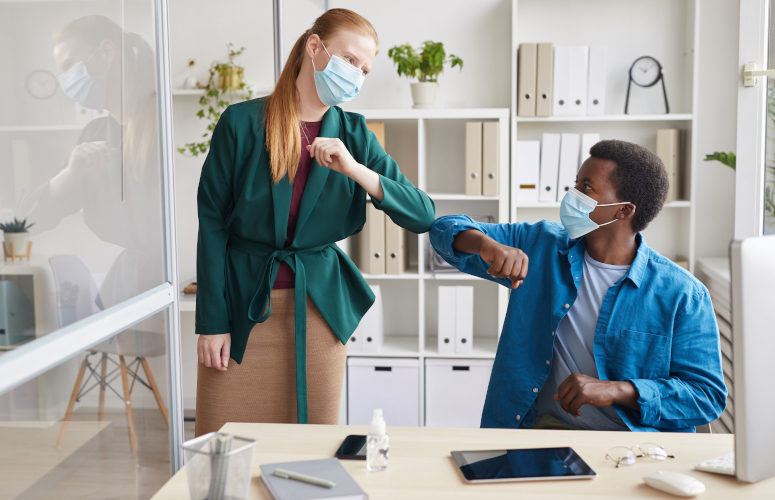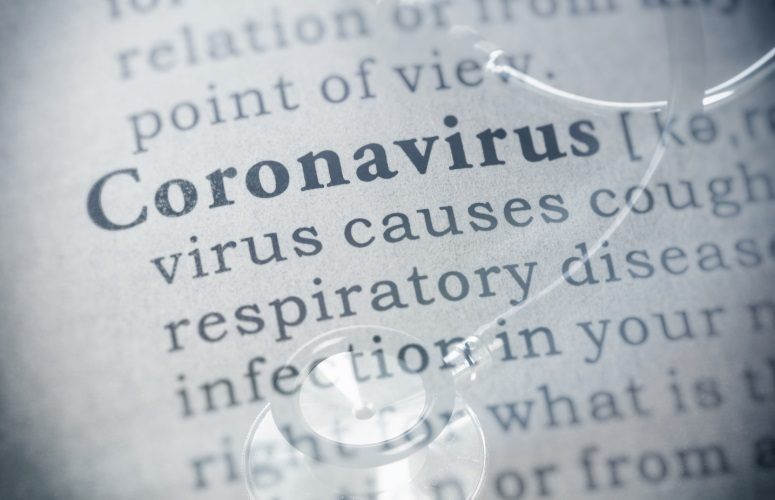
Being Proactive Can Reduce COVID-19 Liability
Companies can reduce their liability in the workplace with well-thought-out safety policies and informed employees.
By Joe Cavaluzzi, Contributing Writer On Nov 10, 2020It takes a lot of thought to come up with workplace safety policies that address COVID-19’s threat to workers and protect a company against liability claims. Employers also need a system for documenting that employees understand the policies and follow them.
In addition, a change in New Jersey’s Workers’ Compensation law that is retroactive to March 9 created the presumption that coronavirus contracted by those whose jobs expose them to COVID-19 is work-related and fully compensable. The New Jersey Business & Industry Association (NJBIA) has suggested that the law puts an added burden on companies already struggling with lost business (see related sidebar, “Are Employers Responsible for COVID-19 Infection?” on page 24), although labor attorneys say the new law provides protection from increased insurance premiums.
The best protection, however, comes from being proactive with comprehensive policies that address the safety of workers – even those working from home – and vigilance to make sure they are understood and followed.
Setting Policies that Protect Workers and Employers
“We have been recommending our clients consider four policies: a telecommuting policy with a home safety checklist; a containment policy; a health screening policy; and a travel policy,” Michael Shadiack, who chairs the employment law group at Connell Foley in Newark, says. “It’s one thing to put policy in place, but it’s another to make sure employees know and understand the policy.”
Shadiack advises clients to send employees a letter detailing the steps the company is taking with the policies attached. “It not only reassures employees, but they’ll also know what their responsibilities are when they come back into the workplace,” he notes. Connell Foley employees must complete an online questionnaire every morning and send it to the human services department before they will be allowed into the building.
In addition to the basics of wearing a mask, washing hands, and social distancing, a containment policy can define the employee’s behavior at work. It might include requiring the use of hand wipes to clean shared printers and tools, instructions for how deliveries to the office will be handled, or even sneezing etiquette.
David Rosen, a Sills Cummins & Gross attorney who has practiced labor and employment law on behalf of management clients since 1977, says it’s important to have someone who understands the company’s workplace develop COVID-19 policies.
“Attorneys can review those policies and make content recommendations, but the plans must be developed by representatives of the employer who are conversant with the workplace facility’s layout, operation and access points,” Rosen says.
It takes creative thinking to develop policies that address problems before they arise, such as whether an employee who voluntarily goes on vacation to a state on New Jersey’s 14-day self-quarantine list will be paid when they stay at home upon their return. Work-at-home policies should address trip hazards such as uneven carpet and exposed computer cables as well as the security of the company’s technology on an employee’s home computer and who will pay for upgrading bandwidth and other utility costs an employee incurs while working from home. Companies need to establish the approval process for overtime for nonexempt employees working at home or they could get hit with unexpected overtime costs.
There is no one-size-fits-all policy to protect employers from liability. It depends on industry and the individual workplace.
“In New Jersey, Governor Murphy’s Executive Order No. 122 requires everyone in manufacturing to wear gloves, even if you’re working in the office all day,” Shadiack says. “It’s important because to avoid liability, you need to be proactive.”
Liability When Employees Get Sick
Employment law is constantly changing, even faster now with rules and guidance on COVID-19. It’s difficult to completely avoid or prevent potential liability if an employee gets sick, but employers can minimize potential liability by staying abreast of changes in the law and engaging in best practices, notes Michael Schmidt, vice chair of the Labor & Employment Department at Cozen O’Conner. Schmidt advises clients to act promptly when a worker comes down with the virus.
“While some businesses have considered the use of liability waivers with employees, there are significant concerns,” Schmidt says. “Government entities (e.g., OSHA) and employee-side attorneys may cite the use of a liability waiver as evidence that the employer acknowledges dangers and unsafe conditions existing in the workplace.”
Rosen suggests that instead of waivers, employers should ask employees to sign an acknowledgment form confirming that the employees will read and comply with the COVID workplace requirements.
“The acknowledgement should say that they understand that despite the employer’s best efforts, there is an inevitable risk of COVID exposure associated with coming into work; that the employees agree they will not report for work if they have any COVID-related symptoms or have been exposed to COVID; that they will promptly seek medical care if they believe they have contracted COVID; and that they will immediately notify human resources if they know they have been exposed,” Rosen says.
When an employee does contract the virus, he says, the employer should ask the employee to identify all other workers with whom he or she came in contact with for contact tracing, self-quarantine for two weeks, and produce a negative COVID test result as a condition of returning to the workplace.
Schmidt cautions against making employment-related decisions, including hiring, based on an employee’s protected status or higher risk because of age or health conditions.
“It is a better practice for employers to wait for an employee to suggest a need for an accommodation, and then assess the request on an individualized basis, which may include consideration of the employee’s particular high-risk status or condition,” he says.
Changes to Workers’ Comp Law
The changes under the workers’ comp law raise concerns for both workers and employers.
“One concern that employees should have is that workers’ compensation benefits awarded under this law could offset benefits otherwise available to them under the federal CARES Act,” Rosen says.
While some companies fear the changes will bring an onslaught of claims, Shadiack says the law includes a provision enabling employers to rebut the presumption of exposure at work by showing the employee a preponderance of the evidence that he or she was not exposed in the workplace.
“Another important part of this legislation is that it excludes COVID-related claims from the company’s experience modification factor, meaning there is no impact on the employer’s insurance premium. That’s a big part of the legislation for the employers and what most businesses are concerned about,” he says.
“Also, under workers’ comp, you can’t sue unless the employer’s intentional act created an unsafe working environment. It’s going to be pretty hard to prove you were negligent if you have been proactive.”
Are Employers Responsible for COVID-19 Infections?
Workers’ compensation law revise is unnecessary and costly.
The New Jersey Business & Industry Association (NJBIA) believes the recent change to the state’s Workers’ Compensation law (S-2380) to include COVID-19 infections puts employers on the hook for big insurance premium increases for benefits that the federal government had already agreed to fund.
S-2380, signed into law by Gov. Phil Murphy in September, creates a presumption that COVID-19 infections occurred at the workplace for certain essential employees, and leaves it up to the employer to prove that it didn’t, says Chrissy Buteas, NJBIA chief government affairs officer.
“Given all the places a person can contract the virus, it is arbitrary to presume that an employee was infected at work,” she says. “It is also nearly impossible to prove a person did not contract the virus at work.”
An industry report put the potential cost at between $400 million and $18 billion.
Buteas says federal programs are already in place to take care of these costs. Health insurance plans are required to cover the cost of COVID-19 treatments, including testing; the Families First Coronavirus Response Act requires employers to provide up to two weeks of paid leave for coronavirus illnesses, which they can recoup through refundable payroll tax credits; and unemployment bonus payments program continues, though at a lower rate.
This law forgoes all of that federal aid and places the burden on the backs of New Jersey employers.
To access more business news, visit NJB News Now.
Related Articles:





